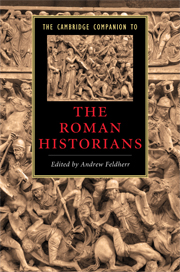Book contents
8 - Time
from Part III - Subjects
Published online by Cambridge University Press: 28 November 2010
Summary
If I say that I am writing these words (or as a Roman would have said, anticipating your reading of them, “I was writing”) on 8 June 2006, anyone reading these words will be able instantly to correlate that location in time with their own present, or with any other location in time back to Caesar's introduction of his reformed calendar on 1 January 45 BCE. Our calendrical system operates on a grid of time extending backwards into a precisely charted past and forwards into a future which can itself be plotted out numerically and which will require no calendrical adjustments until our descendants reach the year 4000 CE and have to decide whether it is going to be a leap year or not. This grid of time encompasses our globalized planet and provides a frame of reference which it is all too easy to be lulled into regarding as simply written into history, almost into nature. Very few readers of this volume will ever find themselves in a position where they have to correlate a date such as “8 June 2006” with a date from another system. A touch of the keyboard brings up Fourmilab's splendid “Calendar Converter”; it will tell you that 8 June 2006 Gregorian equates to a date in the Islamic calendar of 11 Jumada 'l-'Ula 1427 (counting from the era of the Hijira, or “departure,” of the Prophet from Mecca on 16 July 622 CE Julian), or to a date in the Hebrew calendar of 12 Sivan 5766 (counting from the creation of the world).
- Type
- Chapter
- Information
- The Cambridge Companion to the Roman Historians , pp. 139 - 151Publisher: Cambridge University PressPrint publication year: 2009
- 3
- Cited by



